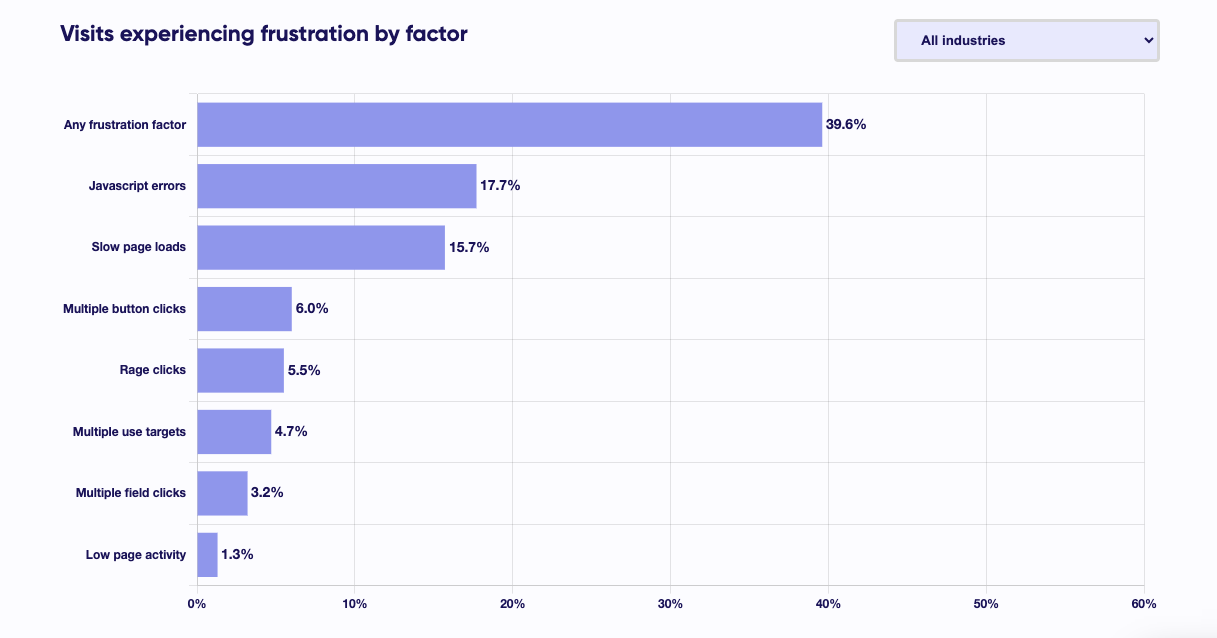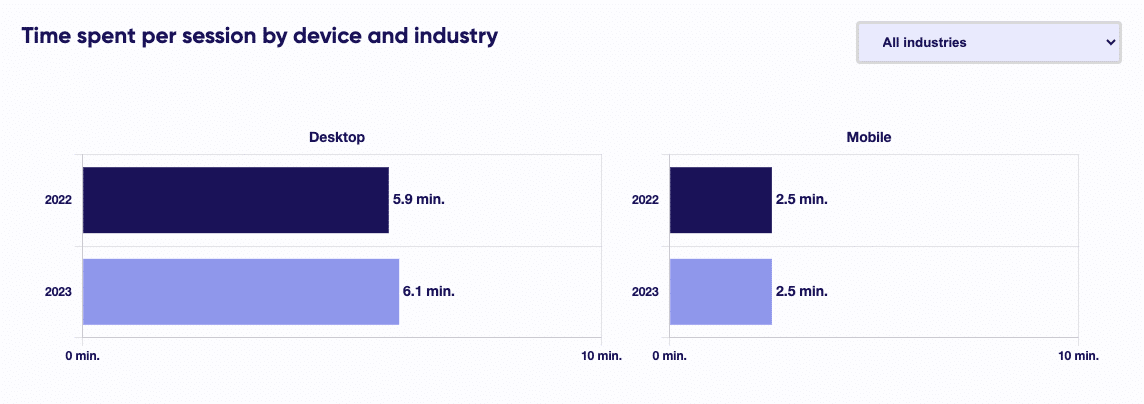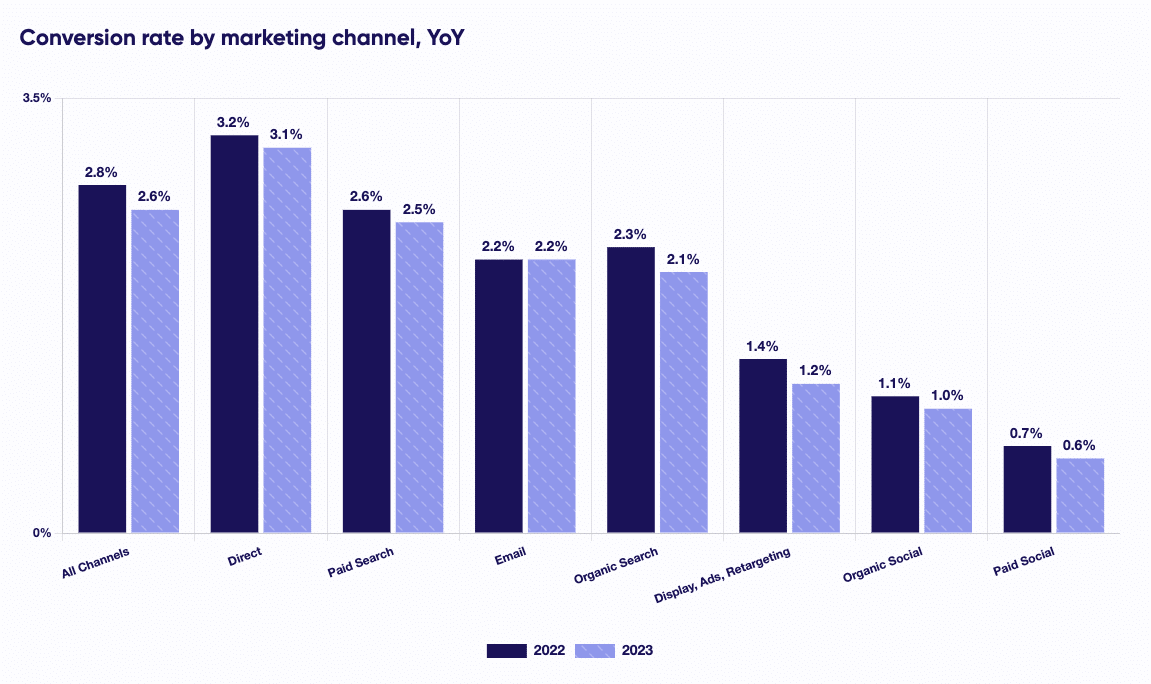Digital Marketing Trends: More Ad Spend, Less Website Traffic
01/03/24
5'
Regarding digital marketing trends, following the challenging periods of 2022 and 2023—marked by inflation, competitive pricing battles, and rising advertising expenses—could 2024 herald a significant change? To answer this, it’s essential to examine the latest trends and statistics. Contentsquare’s 2024 Digital Experience Benchmark Explorer Report provides fresh insights, and we’ve delved into the details. The findings we’ve uncovered are captivating and offer essential reading for every marketing professional.
Digital Marketing in 2024: Overview
The most recent report from Contentsquare sheds light on some pressing issues for brands: they are pouring more money into advertising, but seeing less traffic to their websites as a result! In 2023, there was a significant drop in the number of site visits, yet advertising costs soared, resulting in a 9.4% hike in the expense per site visit.
Additionally, the report points to a troubling trend of user dissatisfaction on websites, which demands immediate attention. In 2023, nearly two out of five (39.6%) of all sessions were tainted by user frustration, a rise of 3.9%. This frustration, caused by factors like slow page loading, unresponsive interfaces, and bewildering user journeys, not only irritates users but also slashes the value of a visit by a substantial 15.0%.

Digital Marketing Trends: Key Analysis
Combining the insights from the report provides a comprehensive view of digital marketing performance across various dimensions, including traffic share by device and marketing channel, session duration by device, and conversion rates by marketing channel over the years 2022 and 2023.
Shift towards mobile usage
The report shows an increase in mobile traffic share (+3,87%), indicating a growing preference for mobile over desktop for web access. This is consistent with broader global trends of increasing smartphone penetration and on-the-go internet usage.

Stability and shifts in traffic sources
Another chart reveals that direct traffic, organic search, and paid search are the leading channels driving web traffic, with direct traffic experiencing a slight decrease (from 28,3% to 27,8%). There was notable growth in paid social (+12%), suggesting an increased focus or return on investment from this channel.
Session duration discrepancies
Desktop users tend to spend more time per session compared to mobile users. The duration for desktop sessions increased slightly from 2022 to 2023, while mobile session duration remained constant. This suggests different user engagement levels and possibly different usage contexts between the two devices.

Conversion rates vary by channel
And finally a chart highlights that direct and paid search channels lead to higher conversion rates compared to other channels. There was a general decrease in conversion rates across most channels from 2022 to 2023. Notably, paid social had the lowest conversion rate, which is especially interesting given its increase in traffic share.
One way to combat this issue is by enhancing your website’s organic visibility through a specialized SEO strategy. For instance, partnering with a digital PR SEO company can help develop a tailored strategy that improves both your SEO ranking and digital PR efforts. Integrating a combination of digital PR and SEO can boost your online presence and ensure that you reach your target audience without the sole dependence on paid ads.

Key learnings for 2024
- Mobile optimization is key: The increased mobile traffic share alongside stable session duration suggests that users are comfortable with mobile interfaces for quick interactions. However, since desktop users spend more time per session, brands should ensure that their websites and digital content are optimized for both quick mobile visits and longer desktop engagements.
- Marketing focus: The stable lead of direct and organic search traffic underscores the importance of SEO and the value of brand recognition and customer loyalty, as these often drive direct visits. However, the increase in paid social traffic share, despite lower conversion rates, suggests that while it’s effective for awareness and engagement, it might not be as effective for conversions. Brands and retailers may need to refine their strategies for conversion optimization in paid social campaigns (for example with performance criteria).
- Conversion optimization: Despite the overall decrease in conversion rates, the stability in paid search conversions indicates that users responding to these ads may have a higher intent to purchase or take action. Companies could benefit from investing in paid search for targeted conversion goals while not neglecting the potential of direct and organic search.
- Engagement vs. efficiency: The increased time spent on desktop sessions could mean that users engage with content more deeply or complete more complex tasks on desktops. In contrast, the static mobile session duration points to efficiency and convenience. Hence, content and design strategies should be tailored to these usage patterns.
Overall, when brands or retailers plan their digital strategy, they should consider these digital marketing trends in user behavior and channel performance. By understanding the nuances of how different channels perform and how users interact with different devices, companies can better allocate their resources, optimize their digital experiences, and ultimately drive better marketing ROI.
Your e-commerce library
E-commerce for Retailers
Learn moreE-commerce for Brands
Learn moreL'Oréal Luxe Success Story
Learn moreSign up for our newsletter
By submitting this form you authorize Lengow to process your data for the purpose of sending you Lengow newsletters . You have the right to access, rectify and delete this data, to oppose its processing, to limit its use, to render it portable and to define the guidelines relating to its fate in the event of death. You can exercise these rights at any time by writing to dpo@lengow.com

Trending Posts
Marketing channels
Where does Gen Z shop online?
Gen Z online shopping is transforming the digital marketplace, setting trends that redefine what it means to engage with brands…
16/04/24
9'
Marketplaces
The Top 10 Marketplaces in Europe
The e-commerce scene is a vibrant mix of marketplaces in Europe. These aren't just websites; they're bustling hubs where millions…
08/12/23
7'
Marketplaces
Lengow Now Fully Supports Zalando Logistics Solutions ZSS and ZRS
Zalando, one of Europe’s leading fashion marketplaces, continues to raise the bar with its advanced logistics and fulfillment programs. After…
12/12/24
4'
Marketplaces
How to win the Buy Box on Marketplaces (Amazon, Zalando, etc.)
What is the most important thing for marketplace sellers? Exactly, the Buy Box! If you don't have the Buy Box…
02/04/24
10'
Marketplaces
How to Sell on Temu? Best Tips
Emerging under the vast umbrella of PDD Holdings Inc., Temu has skyrocketed in popularity as a shopping sensation from China…
17/08/23
5'




